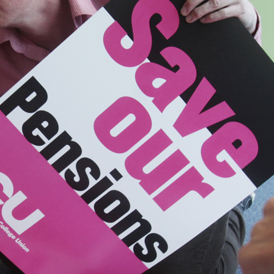Headteachers back first strike in 114 years
Members of the National Association of Head Teachers have voted by more than two to one to back strike action over changes to their pensions.
In one of the highest turnouts in recent ballots, NAHT members in England, Wales and Northern Ireland voted to take action over the Government’s proposed changes to public sector pensions.
It would be the first strike in the union’s 114 year history. Russell Hobby, general secretary of the NAHT, said: “In many ways this is an unhappy milestone. I have spoken at length to many school leaders and not one has been anything other than upset and sometimes downright angry that they have been forced into this situation as the only way to stand up for the profession and standards.”
More than 53.6 per cent per cent of the union’s membership took part in the ballot with the majority, with 75.8 per cent of voting ‘yes’.
The NAHT may now join fellow public sector workers and teaching union colleagues on the picket lines on November 30.
Mr Hobby added: “Teachers are already doing their bit to address the economic downturn by accepting a pay freeze and sharing the burdens of a strapped economy along with every other tax payer. The pay freeze is saving the government hundreds of millions. The proposed cuts are unfair, ill thought-through and purely being used to pay for the mistakes of the financial sector.”
“We would like to avoid action if at all possible and will be negotiating intensely and in good faith in the run up to the 30th.”

The NAHT represents more than 28,500 members in the UK. Members hold leadership positions in 85 per cent of primary schools and more than 40 per cent of secondary schools and virtually every special school, meaning action would affect schools, parents and carers across the country.
More than 53.6 per cent per cent of the union’s membership took part in the ballot with the majority, with 75.8 per cent of voting ‘yes’.
Rod Woodhouse, headteacher of Essendon Primary School voted in favour of industrial action: “What’s happening is unfair. This is another tax on teachers. Headteachers are not happy about closing schools but there’s a feeling that if we don’t the government will walk all over us. Maybe this ballot will bring the government to their senses.”
He added: “I fear for the quality of the profession. The government are looking for stronger graduates but reducing benefits. It’s not joined up thinking.”
At this stage, members have not actually been called out. The NAHT’s general secreatary and the union ‘ s national executive, will now have to consider their next move.
Schools minister Nick Gibb said in response to NAHT proposed strike action: “We are continuing to hold serious discussions about the reforms with the teaching profession. It is right that the unions look very carefully at what is on the table before taking industrial action.
“Strikes benefit no one – they damage pupils’ education; disrupt and inconvenience parents’ lives; and risk the professional reputation of teachers in the eyes of the public.”